苏教译林版七年级上英语 Unit1 知识点梳理
- 格式:docx
- 大小:19.81 KB
- 文档页数:3
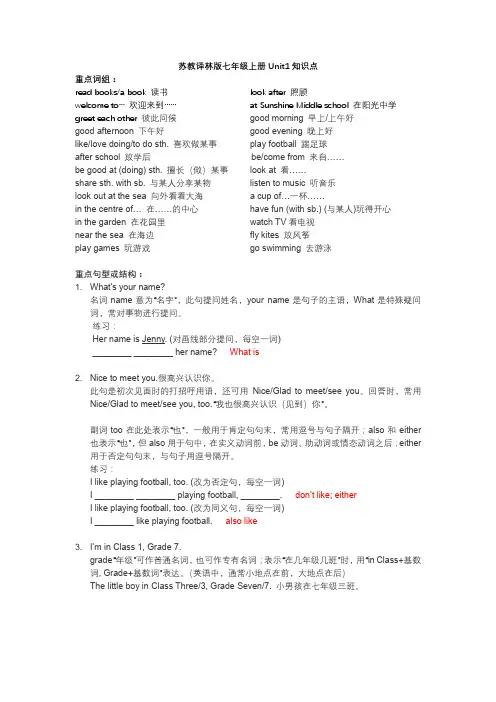
苏教译林版七年级上册Unit1知识点重点词组:read books/a book 读书look after 照顾welcome to…欢迎来到……at Sunshine Middle school 在阳光中学greet each other 彼此问候good morning 早上/上午好good afternoon 下午好good evening 晚上好like/love doing/to do sth. 喜欢做某事play football 踢足球after school 放学后be/come from 来自……be good at (doing) sth. 擅长(做)某事look at 看……share sth. with sb. 与某人分享某物listen to music 听音乐look out at the sea 向外看看大海 a cup of…一杯……in the centre of… 在……的中心have fun (with sb.) (与某人)玩得开心in the garden 在花园里watch TV看电视near the sea 在海边fly kites 放风筝play games 玩游戏go swimming 去游泳重点句型或结构:1. What’s your name?名词name意为“名字”,此句提问姓名,your name是句子的主语,What是特殊疑问词,常对事物进行提问。
练习:Her name is Jenny. (对画线部分提问,每空一词)________ ________ her name? What is2. Nice to meet you.很高兴认识你。
此句是初次见面时的打招呼用语,还可用Nice/Glad to meet/see you。
回答时,常用Nice/Glad to meet/see you, too.“我也很高兴认识(见到)你”。
副词too在此处表示“也”,一般用于肯定句句末,常用逗号与句子隔开;also和either 也表示“也”,但also用于句中,在实义动词前,be动词、助动词或情态动词之后;either 用于否定句句末,与句子用逗号隔开。
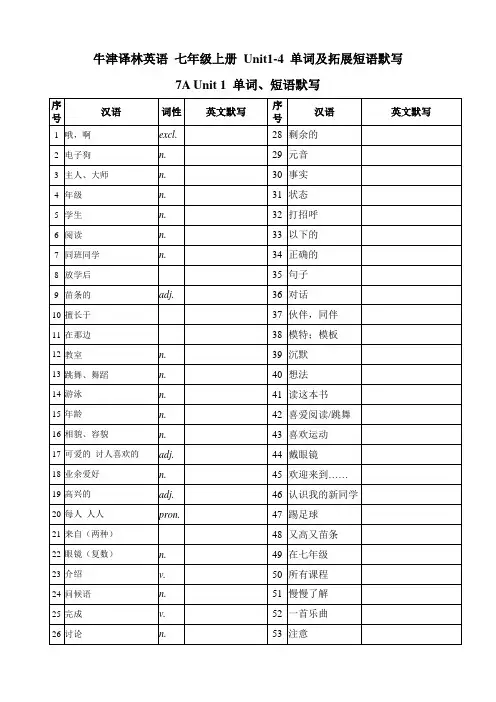
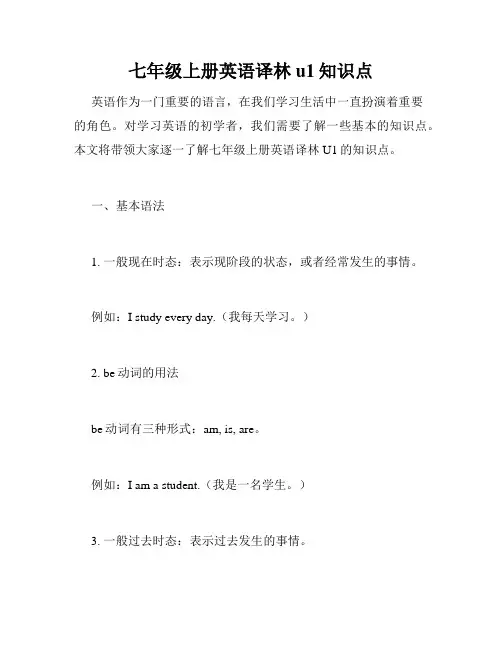
七年级上册英语译林u1知识点英语作为一门重要的语言,在我们学习生活中一直扮演着重要的角色。
对学习英语的初学者,我们需要了解一些基本的知识点。
本文将带领大家逐一了解七年级上册英语译林U1的知识点。
一、基本语法1. 一般现在时态:表示现阶段的状态,或者经常发生的事情。
例如:I study every day.(我每天学习。
)2. be动词的用法be动词有三种形式:am, is, are。
例如:I am a student.(我是一名学生。
)3. 一般过去时态:表示过去发生的事情。
例如:I studied yesterday.(我昨天学习了。
)4. 疑问句疑问句中需要在句首加助动词,但be动词例外。
例如:Do you like English?(你喜欢英语吗?)5. 否定句在句子前加上not,表示否定。
例如:I do not like math.(我不喜欢数学。
)二、基本词汇1. numbers(数字)2. colors(颜色)3. days of the week(一周的日子)4. months(月份)5. seasons(季节)6. school subjects(学校科目)7. classroom objects(教室物品)8. family members(家庭成员)9. nationalities(国籍)三、日常用语1. 问候语Greeting(问候)是日常生活中常用的交流方式,例如:Good morning!(早上好!)Good afternoon!(下午好!)Good evening!(晚上好!)2. 自我介绍当我们遇到新的人时,需要进行自我介绍,例如:Hello, my name is XXX.(你好,我的名字是XXX。
)3. 感谢和赞美当收到帮助或者赞美时,需要用到以下语句:Thank you very much.(非常感谢你。
)You are very kind.(你非常善良。
)四、阅读技巧1. 理解文章主题通过文章中的关键词语和段落结构,可以帮助我们理解整篇文章的主题。
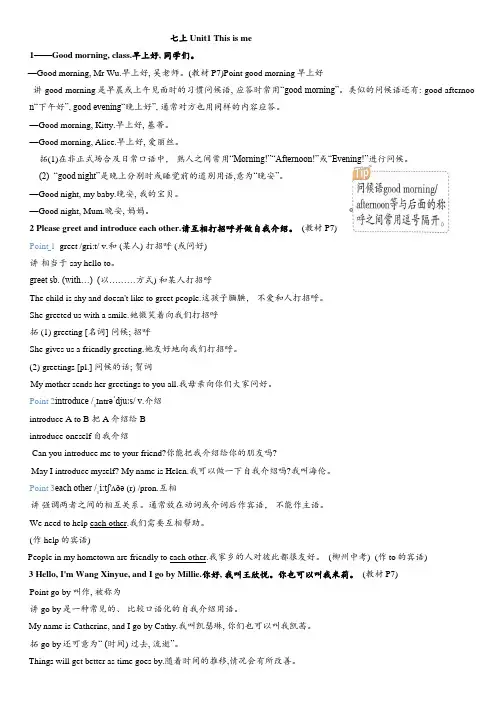
七上 Unit1 This is me1——Good morning, class.早上好, 同学们。
—Good morning, Mr Wu.早上好, 吴老师。
(教材P7)Point good morning早上好讲 good morning是早晨或上午见面时的习惯问候语, 应答时常用“good morning”。
类似的问候语还有: good afternoo n“下午好”, good evening“晚上好”, 通常对方也用同样的内容应答。
—Good morning, Kitty.早上好, 基蒂。
—Good morning, Alice.早上好, 爱丽丝。
拓(1)在非正式场合及日常口语中,熟人之间常用“Morning!”“Afternoon!”或“Evening!”进行问候。
(2) “good night”是晚上分别时或睡觉前的道别用语,意为“晚安”。
—Good night, my baby.晚安, 我的宝贝。
—Good night, Mum.晚安, 妈妈。
2 Please greet and introduce each other.请互相打招呼并做自我介绍。
(教材P7)Point 1 greet /gri:t/ v.和 (某人) 打招呼 (或问好)讲相当于say hello to。
greet sb. (with…) (以………方式) 和某人打招呼The child is shy and doesn't like to greet people.这孩子腼腆,不爱和人打招呼。
She greeted us with a smile.她微笑着向我们打招呼拓 (1) greeting [名词] 问候; 招呼She gives us a friendly greeting.她友好地向我们打招呼。
(2) greetings [pl.] 问候的话; 贺词My mother sends her greetings to you all.我母亲向你们大家问好。
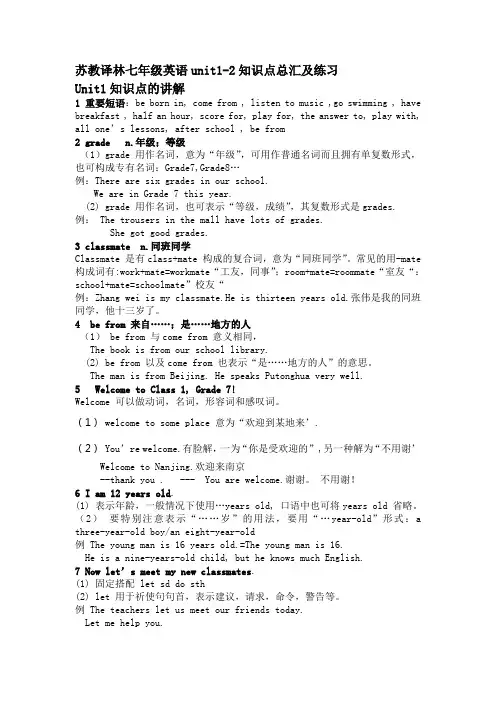
苏教译林七年级英语unit1-2知识点总汇及练习Unit1知识点的讲解1 重要短语:be born in, come from , listen to music ,go swimming , have breakfast , half an hour, score for, play for, the answer to, play with, all one’s lessons, after school , be from2grade n.年级;等级(1)grade用作名词,意为“年级”,可用作普通名词而且拥有单复数形式,也可构成专有名词:Grade7,Grade8…例:There are six grades in our school.We are in Grade 7 this year.(2) grade 用作名词,也可表示“等级,成绩”,其复数形式是grades.例: The trousers in the mall have lots of grades.She got good grades.3 classmate n.同班同学Classmate 是有class+mate 构成的复合词,意为“同班同学”。
常见的用-mate 构成词有:work+mate=workmate“工友,同事”;room+mate=roommate“室友“:school+mate=schoolmate”校友“例:Zhang wei is my classmate.He is thirteen years old.张伟是我的同班同学,他十三岁了。
4 be from 来自……;是……地方的人(1) be from 与come from 意义相同,The book is from our school library.(2) be from 以及come from 也表示“是……地方的人”的意思。
The man is from Beijing. He speaks Putonghua very well.5 Welcome to Class 1, Grade 7!Welcome 可以做动词,名词,形容词和感叹词。
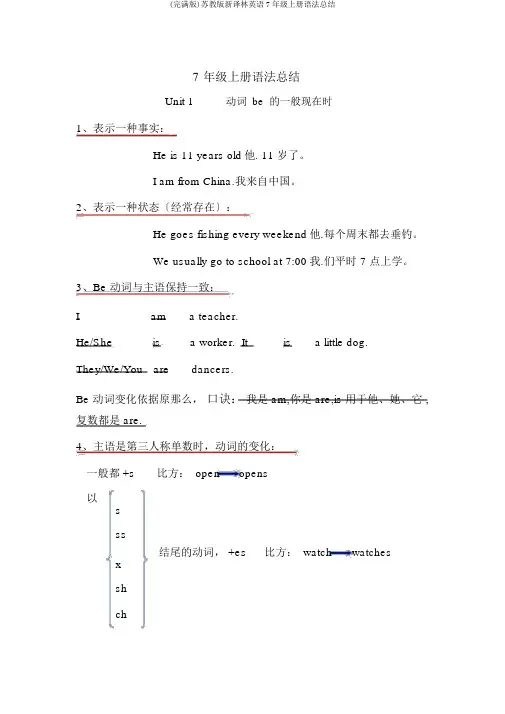
7年级上册语法总结Unit 1动词be的一般现在时1、表示一种事实:He is 11 years old他. 11 岁了。
I am from China.我来自中国。
2、表示一种状态〔经常存在〕:He goes fishing every weekend他.每个周末都去垂钓。
We usually go to school at 7:00我.们平时 7 点上学。
3、Be 动词与主语保持一致:I am a teacher.He/She is a worker. It is a little dog.They/We/You are dancers.Be 动词变化依据原那么,口诀:我是 am,你是 are,is 用于他、她、它 , 复数都是 are.4、主语是第三人称单数时,动词的变化:一般都 +s比方:open opens以sss结尾的动词, +es比方:watch watches xshch辅音字母 +y 结尾的动词, y ies比方:study studies④辅音字母 +o 结尾的动词, +es比方:go goes5、一般现在时的句型变换否认句 be+notShe is in the kitchen.~She is not in the kitchen.They are in the classroom.~Theyare not in the classroom.一般疑问句 be 提前She is in the kitchen.~Is she in the kitchen?—— Yes,she is.—— No,she isn’t.They are in the classroom.~Are they in the classroom?—— Yes,they are.—— No,they aren’t.Unit 2行为动词的一般现在时用法例句I go to school at 7:00 every morning.经常性、习惯性的动作The earth moves around the sun客观事实目前的爱好、能力等She sings very well.1、行为动词形式变化主语行为动词第一人称复数〔we〕/第二人称复原形数〔you〕/第三人称复数〔They〕例句We do our homeworkat home.You have lunch at school. They play basketball after school.第三人称单数〔 He、She、It 〕2、句型变换否认句: do+not/does +not 第三人称单She does her 数homework in theevening.You don’tgo to school on Sunday.He doesn’twork in this shop.句首增加 do/doesDo you play basketball after school?Does John speak Chinese?Unit 3人称代词1、我们常用人称代词表示人或物2、人称代词主格、宾格形式单数复数主格宾格主格宾格第一人称I Me We Us第二人称You You You YouHe Him They Them 第三人称She HerIt It3、主格在句中做主语,一般用在动词前宾格在句中做宾语,一般用在动词、介词后4、有好几个人称代词并列出现时,序次以下:单数: 231 原那么—— you、he and I复数: 123 原那么—— we、you and theyUnit 4表示时间的介词 in、on、at介词用法例子in一天中的早 /中/晚 In the morning/afternoon/evening月份In January/February/March/April季节In Spring/Summer/Autumn/Winter年份In 2021/2021on星期On Sunday/Monday/Tuesday某一天On 1 September某一天的早 /中/晚 On a cold morning/Sunday afternoon特定节日 /一天On Children’s Dayat某一时辰At 8:00年龄At 12 years old频度副词:always>usually>often>sometimes>seldom>neverUnit 5特别疑问句特别疑问词含义例句what什么What‘s your name?Class/grade哪个班级、年级What class/grade are you in? what colour什么颜色What colour do you like?time几点What time is it?when什么时候When do you usually get up? where哪里Where do you live?who谁Who is the man in a blue sweater?why为什么Why are you always late for school?whose谁的Whose pen is this?which哪一个Which is better,the red one or the blue one?how怎么样How do you go to school?many多少〔可数〕How many students are there in your class?much多少〔不能数〕How much milk do you drinkevery day?old几岁How old are you?how often多长时间一次How often do you go to the library?long多长How long is the Yangtze River?多久How long do you watch TVevery day?far多远How far is your home from school?tall多高How tall is the building?注意: when 和 what time 的差异What time 咨询的是详尽时间, when 能够是详尽时间也能够是大体时间。
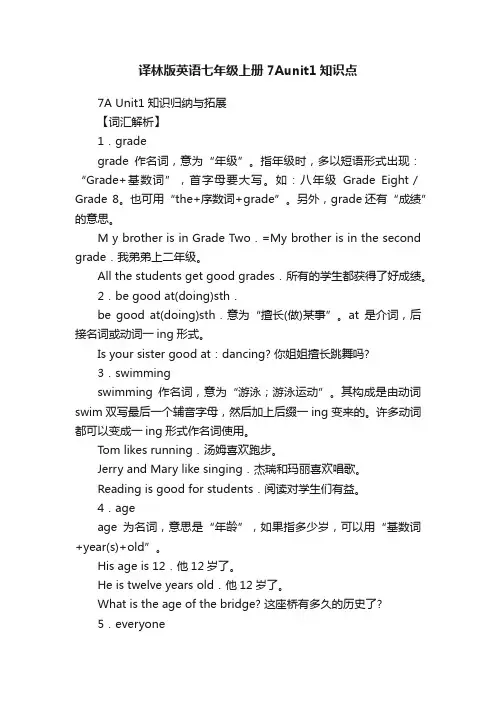
译林版英语七年级上册7Aunit1知识点7A Unit1 知识归纳与拓展【词汇解析】1.gradegrade作名词,意为“年级”。
指年级时,多以短语形式出现:“Grade+基数词”,首字母要大写。
如:八年级Grade Eight/Grade 8。
也可用“the+序数词+grade”。
另外,grade还有“成绩”的意思。
M y brother is in Grade Two.=My brother is in the second grade.我弟弟上二年级。
All the students get good grades.所有的学生都获得了好成绩。
2.be good at(doing)sth.be good at(doing)sth.意为“擅长(做)某事”。
at是介词,后接名词或动词一ing形式。
Is your sister good at:dancing? 你姐姐擅长跳舞吗?3.swimmingswimming作名词,意为“游泳;游泳运动”。
其构成是由动词swim双写最后一个辅音字母,然后加上后缀一ing变来的。
许多动词都可以变成一ing形式作名词使用。
Tom likes running.汤姆喜欢跑步。
Jerry and Mary like singing.杰瑞和玛丽喜欢唱歌。
Reading is good for students.阅读对学生们有益。
4.ageage为名词,意思是“年龄”,如果指多少岁,可以用“基数词+year(s)+old”。
His age is 12.他12岁了。
He is twelve years old.他12岁了。
What is the age of the bridge? 这座桥有多久的历史了?5.everyoneeveryone为代词,意为“每人,人人”,作主语时,谓语动词必须用单数形式。
everyone 是一个词,只用来指人,后面不能跟介词of;every one是两个词,既可用来指人,也可用来指物,后面可跟介词of。
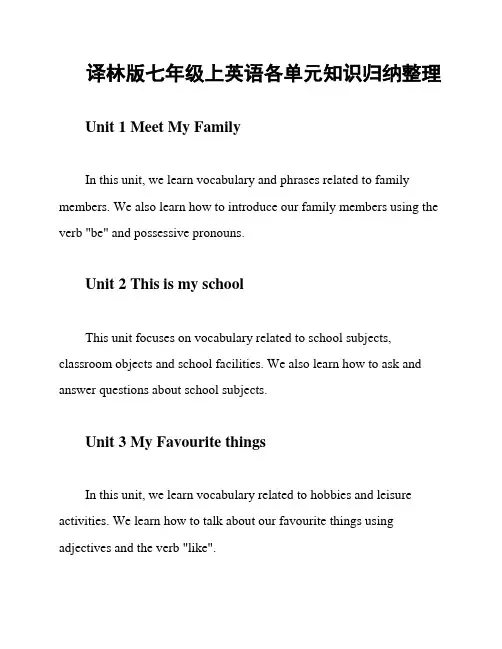
译林版七年级上英语各单元知识归纳整理Unit 1 Meet My FamilyIn this unit, we learn vocabulary and phrases related to family members. We also learn how to introduce our family members using the verb "be" and possessive pronouns.Unit 2 This is my schoolThis unit focuses on vocabulary related to school subjects, classroom objects and school facilities. We also learn how to ask and answer questions about school subjects.Unit 3 My Favourite thingsIn this unit, we learn vocabulary related to hobbies and leisure activities. We learn how to talk about our favourite things using adjectives and the verb "like".Unit 4 The WeatherThis unit focuses on vocabulary related to different types of weather and seasons. We also learn how to ask and answer questions about the weather using the phrase "How's the weather?"Unit 5 At the weekendIn this unit, we learn vocabulary related to weekend activities. We also learn how to talk about our weekend using adverbs of frequency.Unit 6 Food and DrinksThis unit focuses on vocabulary related to food and drinks. We learn how to order food in a restaurant and use the phrases "What would you like?" and "I'd like..."Unit 7 How much are these socks?In this unit, we learn vocabulary related to shopping and prices. We learn how to ask and answer questions about the prices of different items using the phrase "How much is/are...?"Conclusion。
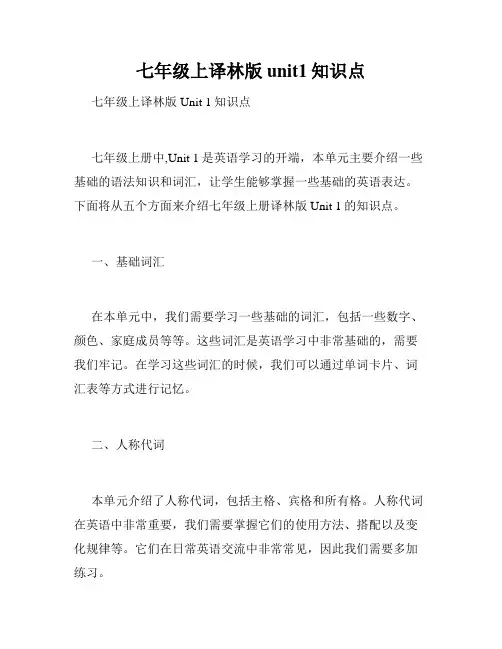
七年级上译林版unit1知识点七年级上译林版Unit 1知识点七年级上册中,Unit 1是英语学习的开端,本单元主要介绍一些基础的语法知识和词汇,让学生能够掌握一些基础的英语表达。
下面将从五个方面来介绍七年级上册译林版Unit 1的知识点。
一、基础词汇在本单元中,我们需要学习一些基础的词汇,包括一些数字、颜色、家庭成员等等。
这些词汇是英语学习中非常基础的,需要我们牢记。
在学习这些词汇的时候,我们可以通过单词卡片、词汇表等方式进行记忆。
二、人称代词本单元介绍了人称代词,包括主格、宾格和所有格。
人称代词在英语中非常重要,我们需要掌握它们的使用方法、搭配以及变化规律等。
它们在日常英语交流中非常常见,因此我们需要多加练习。
三、数词数词在英语中非常重要,不仅用于表示具体的数量,还可以用于表示顺序、大小、日期、时间等等。
在学习数词的时候,我们需要着重掌握基数词、序数词、分数和小数的使用方法。
四、名词的单数和复数形式在英语中,一些名词的单数和复数形式是不规则的,需要我们进行逐一记忆。
同时,我们还需要掌握一些名词的复数形式的变化规律,以便正确使用它们。
五、动词的时态本单元介绍了动词的基本时态——一般现在时、一般过去时和一般将来时。
动词的时态在英语交流中非常重要,需要我们掌握其变化规律和不同时间状语的搭配等。
总结以上就是七年级上册译林版Unit 1的基础知识点,希望同学们能够认真掌握,并通过多次练习来巩固所学知识。
英语学习需要长期坚持,只有不断地练习才能够取得进步。
希望同学们通过对本单元内容的学习,能够打下英语学习的坚实基础。
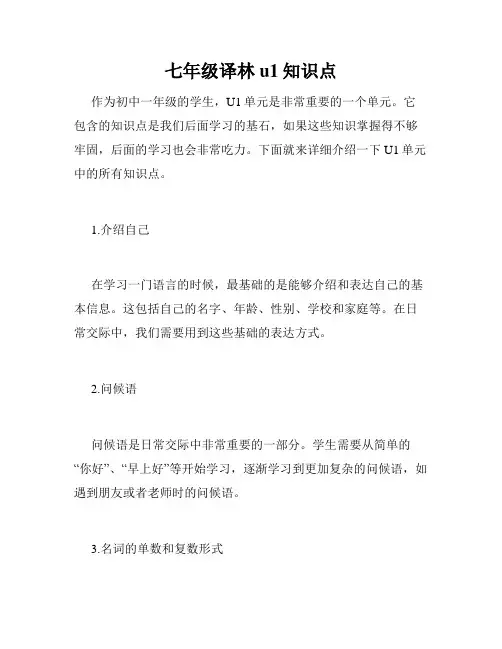
七年级译林u1知识点作为初中一年级的学生,U1单元是非常重要的一个单元。
它包含的知识点是我们后面学习的基石,如果这些知识掌握得不够牢固,后面的学习也会非常吃力。
下面就来详细介绍一下U1单元中的所有知识点。
1.介绍自己在学习一门语言的时候,最基础的是能够介绍和表达自己的基本信息。
这包括自己的名字、年龄、性别、学校和家庭等。
在日常交际中,我们需要用到这些基础的表达方式。
2.问候语问候语是日常交际中非常重要的一部分。
学生需要从简单的“你好”、“早上好”等开始学习,逐渐学习到更加复杂的问候语,如遇到朋友或者老师时的问候语。
3.名词的单数和复数形式名词的单复数是英语中最基础的语法之一。
学生需要掌握名词复数的规则和不规则变化,如单数变复数时的加-s和-es、以y结尾的名词变复数时的变y为i加-es等。
4.动词的一般现在时学生需要能够正确地运用一般现在时,即在主语为第三人称单数时,动词的形式要加上-s或-es。
同时,学生也需要掌握否定句和疑问句的构成方式。
5.数字和日期数字和日期是日常生活中非常重要的元素。
学生需要掌握基本的数字、算术运算符、分数和比例的表达方式。
同时,学生也需要掌握日期的表达方式,包括年、月、日和星期几等。
6.物品的颜色掌握物品颜色的表达方式,可以让学生在日常生活中更好地描述事物。
学生需要掌握颜色的英文表达方式,如红色、蓝色、黄色等。
7.日常生活中的活动日常生活中的活动非常丰富多彩,学生需要掌握这些活动的表达方式,如打篮球、听音乐、看电影等。
8.基本询问句型学生需要掌握基本的询问句型,包括一般疑问句和特殊疑问句。
通过正确地运用这些句型可以更好地了解周围的事情。
9.情态动词情态动词包括can、could、may、might、should、would等,是英语中非常重要的语法之一。
学生需要掌握它们的用法和意义,以便在日常交际和写作中更好地表达自己的意思。
10.基本的治理句型治理句型是日常交际和写作中常用的一种语法形式。
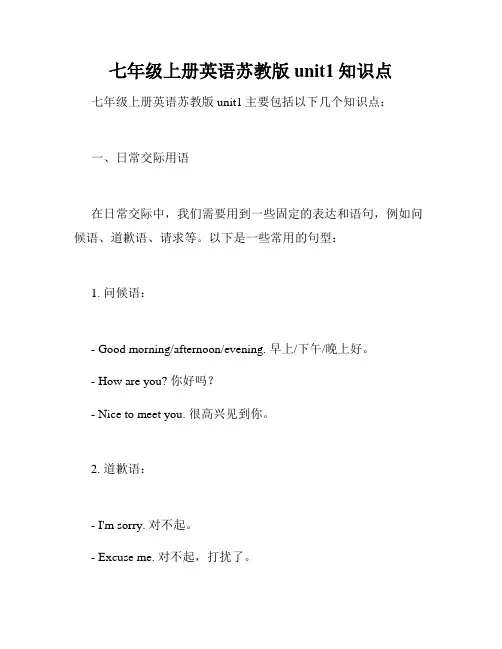
七年级上册英语苏教版unit1知识点七年级上册英语苏教版unit1主要包括以下几个知识点:一、日常交际用语在日常交际中,我们需要用到一些固定的表达和语句,例如问候语、道歉语、请求等。
以下是一些常用的句型:1. 问候语:- Good morning/afternoon/evening. 早上/下午/晚上好。
- How are you? 你好吗?- Nice to meet you. 很高兴见到你。
2. 道歉语:- I'm sorry. 对不起。
- Excuse me. 对不起,打扰了。
3. 请求:- Can/Could you help me, please? 请你帮我一下好吗?- May I go to the toilet, please? 我能去洗手间吗?二、数词我们在日常生活中需要使用到数字,例如年龄、时间、日期等。
以下是一些常用的数词:1. 基数词:- 1 - one- 2 - two- 3 - three- 4 - four- 5 - five- 6 - six- 7 - seven- 8 - eight- 9 - nine- 10 - ten2. 序数词:- 1st - first- 2nd - second- 3rd - third- 4th - fourth- 5th - fifth- 6th - sixth- 7th - seventh- 8th - eighth- 9th - ninth- 10th - tenth 三、动词的时态动词的时态主要有一般现在时、一般过去时和一般将来时。
以下是各种时态的构成和用法:1. 一般现在时:构成:主语+动词原形(第三人称单数加-s)用法:- 表示现在的情况、习惯或常态。
- 表示客观事实或真理。
- 表示将来的时间表或安排。
例句:- I like swimming. 我喜欢游泳。
- My father works in a company. 我父亲在一家公司工作。
七年级上册译林版英语知识点u1在七年级上册中,第一单元的英语学习内容主要包括以下几个方面:一、基础语法知识1. 名词复数形式的规则当名词单数形式以辅音字母+y结尾时,应将y改为i后加-es,如:city - cities;当名词以辅音字母加o结尾时,一般加-es,如:potato - potatoes。
但也有例外,如:hero - heroes。
当名词单数形式以f或fe结尾时,通常把f或fe改为ves,如:knife - knives;wife - wives。
2. 动词be的用法动词be是英语中最基本的动词之一,它可以表示“是、在、存在”等。
它的变化形式比较多,根据时态和人称的不同而不同。
be动词的肯定式和否定式:肯定式:I am (I'm) / he is (he's) / she is (she's) / it is (it's) / you are (you're) / we are (we're) / they are (they're)否定式:I am not / he is not (he isn't) / she is not (she isn't) / it is not (it isn't) / you are not (you aren't) / we are not (we aren't) / they are not (they aren't)3. 一些重要的不规则动词英语中有一些动词的过去式、过去分词和原形都不同,这些动词被称为不规则动词。
了解这些动词的不规则形式,对于学习英语语法和提高英语能力非常有帮助。
动词过去式/过去分词/原形:be - was/were - beendo - did - doneeat - ate - eatengo - went - gonebuy - bought - bought4. 一些基本短语的用法在口语和书面语中,一些常用短语被广泛使用。
七年级上册英语译林版unit1知识点本文将为大家介绍七年级上册英语译林版Unit1的知识点,包括词汇、语法和语音三个方面。
一、词汇1.1 单词在Unit1中,我们需要学习并掌握一些基本的单词,如:hello 你好morning 早上afternoon 下午evening 晚上night 夜晚day 白天name 名字what 什么is 是my 我的your 你的his 他的her 她的thank 谢谢you 你very 很1.2 短语在Unit1中,我们还需要学习掌握一些常用的短语,如:Good morning 早上好Good afternoon 下午好Good evening 晚上好My name is... 我的名字是...What is your name? 你的名字是什么?Where are you from? 你来自哪里?I'm from... 我来自...Nice to meet you 很高兴见到你Thank you 谢谢你You're welcome 不客气Very good 非常好Very well 很好How are you? 你好吗?I'm fine, thank you. 我很好,谢谢And you? 你呢?二、语法2.1 be动词在Unit1中,我们学习的第一个语法知识点是be动词的用法。
be动词有三种形式:am、is、are。
它们的具体用法如下:am用于第一人称单数:I am...is用于第三人称单数(he、she、it):She is...are用于第一、二、三人称复数(we、you、they):We are...例如,“My name is Tom.”(我的名字是汤姆。
)2.2 人称代词在Unit1中,我们还需要学习并掌握人称代词的用法。
人称代词分为主格和宾格两种形式。
主格用于主语,宾格用于宾语。
人称代词的具体用法如下:主格宾格说明I me 我you you 你he him 他she her 她it it 它we us 我们they them 他们例如,“This is my friend. Her name is Mary.”(这是我的朋友。
七年级英语unit1知识点归纳译林版一、课时一:Hello!1. 基本问候语及回答(Hello, Hi, Goodmorning/afternoon/evening),并学会正确发音。
2. 介绍自己的名字和国家(My name is…, I’m from…)。
二、课时二:My Day1. 学会表述自己每日的日常活动(get up, havebreakfast/lunch/dinner, go to school, go home, go to bed)。
2. 学会使用一些时间短语,如in the morning/afternoon/evening,at night等。
3. 学会表述自己喜欢的活动(like doing/hate doing)。
三、课时三:My School1. 学会表述自己所在的学校的名称及地址。
2. 学会询问及表述一些人物和物品的所在地(Where is…? It’s in/on/under…)。
3. 学会表述自己的校园生活及校园设施(classroom, library, playground等)。
四、课时四:My Family1. 学会使用一些家庭成员的称呼,如father, mother, brother, sister等。
2. 学会表述自己家庭成员的姓名及年龄,并能询问他人的家庭情况(How many people are there in your family? Who are they?)。
3. 学会表述自己和家人在日常生活中的活动(cook, watch TV, read books等)。
五、课时五:Colors and Clothes1. 学会表述一些颜色及表达感觉的形容词,如yellow, green, red, blue, purple, beautiful, comfortable等。
2. 学会表述一些穿着的装备,如T-shirt, pants, skirt等,并能用颜色及形容词修饰。
新译林七年级上册第一单元知识点梳理1.I love e-dogs.love7A Unit1知识点love to do=love doing=enjoy doingAn e-dog2.询问别人的名字What’s your name?回答:I’m…。
/ My name is….May I know your name。
Yes。
I’m…Are you Mr Green?Yes I am。
/ Sorry。
I’m Mr Brown.Is your name Li Lei?Yes,itis.3.How to look after your E-dog1)look after=take care of2)how to do sth怎样做特殊疑问词+to doDo you know how to ride a bike?e to the unit1.each other二者之间相互Do you XXX’sname?2.Nice to meet you.回答Nice to meet you,too.(朋友见面非正式场合)Reading1.Class One。
Grade Seven七年级一班(注意,几个首字母都必须要大写。
其中数字也可用阿拉伯数字来代替)对年级发问:What grade are you in?2.I’m 12 years old.对年龄提问:How old are you?=What’s your age?3.Now let’XXX.let sb do sth否认方式:let sb not do sth.注意:在这个结构中,sb需要用人称代词的宾格,do要用动词原形,若所给的是be动词,则间接用be动词便可Let’sbefriends.让我们成为同伙吧4.short短→反义词:long矮→反义词:tall5.like doing sth = like to do sth.注意:chat—chattingsit—sittinglike sth6.after school下学after class下课中间不可加冠词,也无需加复数7.球类运动前不加冠词,乐器前一定要加冠词the。
初一英语知识点总结译林版上册u1初一英语知识点总结译林版上册u1初一英语知识点总结译林版上册u1初一英语知识点总结译林版上册u1 ,是初一年级英语教材中的第一个单元。
本单元的主题为“Hello”。
在这个单元中,学生们将学习关于问候和自我介绍的基本表达方式。
接下来,我们将对本单元的重要知识点进行总结。
1. 问候语和表达方式:学生们将学习常用的问候语,如“Hello”,“Good morning”,“Good afternoon”和“Good evening”。
同时,学生们还将学习如何进行自我介绍,表达自己的姓名,年龄和国籍等。
2. 人称代词:学生需要掌握人称代词的用法,包括主格和宾格的区别。
主要的人称代词有I, you, he, she, it, we 和 they。
3. 数字和数量词:学生将学习基本的数字表达方式,包括1-20的数字,以及10的整数倍。
除此之外,学生们还需要了解一些数量词的使用,如“a few”,“a little”,“some”和“many”等。
4. 介词的使用:学生需要掌握一些常用的介词,如“in”,“on”,“at”,“with”,“near” 和“between”等。
这些介词可以用于表示时间、地点、伴随等不同的含义。
5. 一般现在时:学生将初步接触一般现在时的用法,学习如何用于描述日常生活和习惯。
同时,学生还需要掌握一般现在时态的肯定句、否定句和疑问句的构造。
6. 单词拼写和发音:学生将学习一些基本的英文单词,包括常见的问候语、数字、月份和星期几等。
同时,学生们也需要掌握这些单词的正确拼写和发音。
以上六点是初一英语译林版上册u1单元的重要知识点总结。
通过学习这些知识点,学生们将能够初步掌握英语的基本表达方式,能够进行简单的自我介绍和问候。
同时,通过这个单元的学习,学生们也能够为未来的学习打下坚实的基础。
希望以上对初一英语译林版上册u1单元的重要知识点总结能对同学们的学习有所帮助。
7上U1知识点重点词汇(1)名词e-dog电子狗 grade年级student学生 reading阅读classroom教室 dancing跳舞,舞蹈looks相貌,容貌 age年龄swimming游泳 hobby业余爱好master主人;大师 classmate同班同学glasses复]眼镜(2)形容词slim苗条的 glad高兴的cute可爱的;讨人喜欢的(3)代词everyone每人,人人 play football踢足球like music喜欢音乐 fly kites放风筝be good at擅长 ... years old…岁be from..来自于……;是……的人good morning/ afternoon/ evening早上/下午/晚上好after school放学后 all the lessons所有的功课wear glasses I眼镜 live with..和…住Class1, Grade7七年级(1)班 love reading喜欢阅读二、重要句型1.- What 's your name?你叫什么名字? -My name is Hobo。
我的名字叫霍波。
2.- Are you my master?你是我的主人吗? Yes,I am。
是的,我是你的主人。
3. I’m12 Years old.我12岁。
4. I have short hair。
我留着短发。
5. I love reading。
我爱阅读。
6. I often play football after school我经常放学后踢足球7. He is good at Maths。
他擅长数学。
8. Sandy does not have long hair。
桑迪没有留长发。
9. Sandy is tall and slim。
桑迪又高又苗条。
10.Are you happy?你/你们高兴吗? Yes. I am/we are是的,我/我们高兴。
苏教译林版七年级上英语Unit1 知识点梳理
短语归纳:
1.look after take care of 照顾
2.on the first day 在第一天
3.Class 1,Grade 7 七年级1班
4.play football 踢足球
5.after school 放学后
6.become from 来自
7.be good at do well in 擅长
8.fly kite s 放风筝
9.go home 回家
10.listen to music 听音乐
11.play a game 玩游戏
12.wear glasses 戴眼镜
13.at school 在学校
14.all the lessons 所有的课程
15.talk about 谈论
16.over there 那里
17.a lot of hobbies 许多爱好
用法集萃:
1.lovelike doing sth 喜欢做某事
2.let’s +动词原形让我们……
3.I amMy name is 我叫……
4.welcome to +地点欢迎来到……
5.This is...... 这是……
6.be good at do well in doing 擅长做某事
7.in Class…Grade…在几年级几班
8.live with…in…和……住在……
9.I’m …year old. 我……岁了。
10.I have…hair.我留着……头发
典句背诵:
1.What’s your name?你叫什么名字?
2.Nice to meet you! 很高兴见到你。
3.I love reading. 我喜欢阅读
4.Now let’s meet our new classmates. 现在让我们认识下我们的新同学。
5.I often play football after school.放学后我经常踢足球。
6.She is tall and slim. 她个头很高,身材苗条。
7.He is from Nanjing. 他来自南京。
8.He is good at Maths. 他擅长于数学。
lie is 11 years old.米莉11岁。
10.They are all very nice.他们都很好。